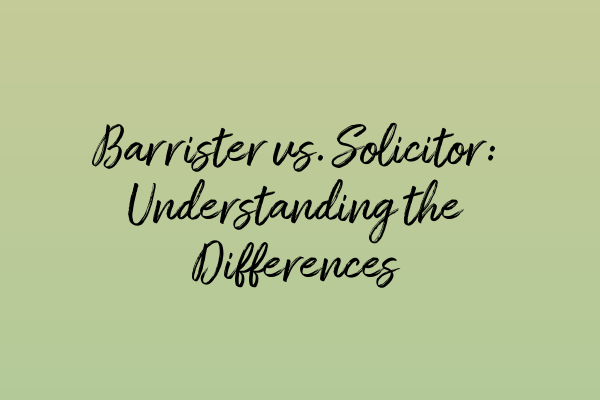Barrister vs. Solicitor: Understanding the Differences
When it comes to pursuing a legal career in the UK, the terms barrister and solicitor are often used interchangeably. However, these two roles have distinct differences that are important to understand before choosing a legal path. In this article, we will explore the contrasting roles of barristers and solicitors, shedding light on their unique responsibilities and areas of expertise.
1. Breaking Down the Roles
Let’s start by clarifying the definitions of barristers and solicitors. Barristers are legal professionals who specialize in court advocacy and advising clients on legal matters. They typically work in private chambers and have rights of audience in higher courts, meaning they can represent clients in complex legal proceedings. On the other hand, solicitors are legal practitioners who provide legal advice, handle legal documents and negotiations, and represent clients in lower courts. They often work directly with individuals or businesses to handle day-to-day legal matters.
2. Education and Training
To become a barrister, an individual must complete a law degree, followed by the Bar Professional Training Course (BPTC). Afterward, they join an Inn of Court, where they undertake a period of pupillage (apprenticeship) with an experienced barrister. This training equips them with the necessary courtroom skills and legal knowledge to excel in their profession.
Solicitors, on the other hand, must complete a qualifying law degree or a non-law degree followed by a law conversion course, usually the Legal Practice Course (LPC). They must then complete a two-year training contract with a law firm or organization accredited by the Solicitors Regulation Authority (SRA). This practical training allows solicitors to gain hands-on experience in various legal areas.
3. Areas of Practice
Barristers are known for their specialist advocacy skills. They are often instructed by solicitors or directly by clients to provide expert legal opinions or represent them in court. Barristers usually focus on specific areas of law, such as criminal law, family law, commercial law, or employment law. Their main role is to present a client’s case in court, provide legal opinions, and draft legal arguments.
Solicitors, on the other hand, have a broader range of responsibilities. They handle various legal matters such as property transactions, wills and probate, contract drafting, employment law, and family law. Solicitors can represent their clients throughout the entire legal process, ranging from initial advice to drafting legal documents and negotiating settlements.
4. Collaborative vs. Independent Practice
Barristers often work independently within a network of chambers, although they may collaborate with solicitors when handling complex cases. Solicitors, on the other hand, frequently work within larger law firms alongside other legal professionals. This collaborative environment enables solicitors to consult with colleagues on a wide range of legal matters and benefit from their diverse expertise.
5. Courtroom Advocacy
One of the key distinctions between barristers and solicitors is their roles in courtroom advocacy. Barristers, with their specialized training and expertise, are the primary advocates in court. They prepare arguments, cross-examine witnesses, and present cases to judges and juries. Solicitors, while qualified to appear in lower courts, often engage barristers when a case requires specialist advocacy in higher courts.
6. Public Perception
Barristers are often associated with the glamour of courtroom dramas portrayed in popular media. They are seen as the legal experts who passionately defend their clients’ interests in the courtroom. Solicitors, on the other hand, are generally viewed as the approachable and practical advisors who guide clients through their legal challenges. Both professions play critical roles in the legal field, but their public perception differs due to the nature of their work.
In conclusion, barristers and solicitors are two distinct legal roles in the UK with different responsibilities, training, and areas of expertise. Barristers specialize in courtroom advocacy and providing expert legal opinions, while solicitors focus on providing legal advice and handling various legal matters. Understanding these distinctions will help aspiring legal professionals make informed decisions about their career paths. Whether you choose to become a barrister or solicitor, both roles offer rewarding opportunities to serve clients and contribute to the legal system.
If you have further questions about becoming a solicitor, please feel free to get in touch with us at Becoming-solicitor-sra.co.uk! Our team of qualified solicitors is here to provide you with expert guidance and support on your journey to becoming a legal professional.


Leave a Reply